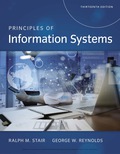
Principles of Information Systems (MindTap Course List)
13th Edition
ISBN: 9781337516945
Author: STAIR
Publisher: Cengage
expand_more
expand_more
format_list_bulleted
Question
Chapter 14.1, Problem 2RQ
Program Plan Intro
- The information system resources are shown below:
- People Resources:
- People are vital for information
system operations. - It includes end users as well as IS specialists.
- The end users use an information system or data it produces.
- The IS specialists develop as well as operate information systems.
- It includes system analysts, computer operators as well as clerical IS personnel.
- People are vital for information
- Hardware Resources:
- It comprises physical devices as well as materials used for information processing.
- It includes machines, such as computers and other equipment plus data media.
- The computer systems contain central processing unit that has microprocessors and different interconnected devices.
- The computer peripherals are devices such as keyboard, mouse and disks for storage.
- Software Resources:
- It includes all set of instructions for information processing.
- It contains set of operating instructions named programs that directs and controls computer hardware.
- Each system contains a software resource component.
- It denotes instructions for information processing.
- Data Resources:
- The data required for operations is considered as data resources.
- It must be used effectively for benefitting all end users.
- It includes image data, audio data, human voice and other forms.
- People Resources:
CyberLoafing:
- The aspect of cyber loafing denotes a non-productive application of information system resources.
- It is used to describe employee actions that use internet access at work for personal usages.
- It denotes actions that are for personal gains and not for legitimate work.
- The cyber loafing related activities are time consuming as well as costly.
Expert Solution & Answer
Want to see the full answer?
Check out a sample textbook solution
Students have asked these similar questions
Hello please look at the attached picture. I need an detailed explanation of the architecture
Information Security Risk and Vulnerability Assessment
1- Which TCP/IP protocol is used to convert the IP address to the Mac address? Explain 2-What popular switch feature allows you to create communication boundaries between systems connected to the switch3- what types of vulnerability directly related to the programmer of the software?4- Who ensures the entity implements appropriate security controls to protect an asset?
Please do not use AI and add refrence
Find the voltage V0 across the 4K resistor using the mesh method or nodal analysis. Note: I have already simulated it and the value it should give is -1.714V
Chapter 14 Solutions
Principles of Information Systems (MindTap Course List)
Ch. 14.1 - What is the harm in nonproductive use of...Ch. 14.1 - Prob. 2RQCh. 14.1 - Do you think that it would help to involve a small...Ch. 14.1 - Prob. 2CTQCh. 14.2 - Prob. 1RQCh. 14.2 - Prob. 2RQCh. 14.2 - Prob. 1CTQCh. 14.2 - Prob. 2CTQCh. 14.3 - Prob. 1RQCh. 14.3 - Prob. 2RQ
Ch. 14.3 - Prob. 1CTQCh. 14.3 - Prob. 2CTQCh. 14.4 - Prob. 1RQCh. 14.4 - Prob. 2RQCh. 14.4 - Prob. 1CTQCh. 14.4 - Prob. 2CTQCh. 14 - Prob. 1SATCh. 14 - Prob. 2SATCh. 14 - Prob. 3SATCh. 14 - Prob. 4SATCh. 14 - Prob. 5SATCh. 14 - Prob. 6SATCh. 14 - Prob. 7SATCh. 14 - Prob. 8SATCh. 14 - Prob. 9SATCh. 14 - Prob. 10SATCh. 14 - Prob. 11SATCh. 14 - Prob. 12SATCh. 14 - Prob. 13SATCh. 14 - Prob. 14SATCh. 14 - Prob. 15SATCh. 14 - Prob. 16SATCh. 14 - Prob. 1RQCh. 14 - Prob. 2RQCh. 14 - Prob. 3RQCh. 14 - Prob. 4RQCh. 14 - Prob. 5RQCh. 14 - Prob. 6RQCh. 14 - Prob. 7RQCh. 14 - Prob. 8RQCh. 14 - Prob. 9RQCh. 14 - Prob. 10RQCh. 14 - Prob. 11RQCh. 14 - Prob. 12RQCh. 14 - Prob. 1DQCh. 14 - Prob. 2DQCh. 14 - Prob. 3DQCh. 14 - Prob. 4DQCh. 14 - Prob. 5DQCh. 14 - Prob. 6DQCh. 14 - Prob. 7DQCh. 14 - Prob. 8DQCh. 14 - Prob. 9DQCh. 14 - Prob. 10DQCh. 14 - Prob. 1PSECh. 14 - Prob. 1TACh. 14 - Imagine that your team has been hired to conduct a...Ch. 14 - Prob. 3TACh. 14 - Prob. 1WECh. 14 - Prob. 2WECh. 14 - Prob. 3WECh. 14 - Prob. 1CECh. 14 - Prob. 2CECh. 14 - Prob. 3CECh. 14 - Prob. 1CTQ1Ch. 14 - Prob. 2CTQ1Ch. 14 - Prob. 3CTQ1Ch. 14 - Prob. 1CTQ2Ch. 14 - Prob. 2CTQ2Ch. 14 - Prob. 3CTQ2
Knowledge Booster
Similar questions
- Briefly describe the issues involved in using ATM technology in Local Area Networksarrow_forwardFor this question you will perform two levels of quicksort on an array containing these numbers: 59 41 61 73 43 57 50 13 96 88 42 77 27 95 32 89 In the first blank, enter the array contents after the top level partition. In the second blank, enter the array contents after one more partition of the left-hand subarray resulting from the first partition. In the third blank, enter the array contents after one more partition of the right-hand subarray resulting from the first partition. Print the numbers with a single space between them. Use the algorithm we covered in class, in which the first element of the subarray is the partition value. Question 1 options: Blank # 1 Blank # 2 Blank # 3arrow_forward1. Transform the E-R diagram into a set of relations. Country_of Agent ID Agent H Holds Is_Reponsible_for Consignment Number $ Value May Contain Consignment Transports Container Destination Ф R Goes Off Container Number Size Vessel Voyage Registry Vessel ID Voyage_ID Tonnagearrow_forward
- I want to solve 13.2 using matlab please helparrow_forwarda) Show a possible trace of the OSPF algorithm for computing the routing table in Router 2 forthis network.b) Show the messages used by RIP to compute routing tables.arrow_forwardusing r language to answer question 4 Question 4: Obtain a 95% standard normal bootstrap confidence interval, a 95% basic bootstrap confidence interval, and a percentile confidence interval for the ρb12 in Question 3.arrow_forward
arrow_back_ios
SEE MORE QUESTIONS
arrow_forward_ios
Recommended textbooks for you
 Principles of Information Systems (MindTap Course...Computer ScienceISBN:9781305971776Author:Ralph Stair, George ReynoldsPublisher:Cengage Learning
Principles of Information Systems (MindTap Course...Computer ScienceISBN:9781305971776Author:Ralph Stair, George ReynoldsPublisher:Cengage Learning Fundamentals of Information SystemsComputer ScienceISBN:9781337097536Author:Ralph Stair, George ReynoldsPublisher:Cengage Learning
Fundamentals of Information SystemsComputer ScienceISBN:9781337097536Author:Ralph Stair, George ReynoldsPublisher:Cengage Learning Principles of Information Systems (MindTap Course...Computer ScienceISBN:9781285867168Author:Ralph Stair, George ReynoldsPublisher:Cengage Learning
Principles of Information Systems (MindTap Course...Computer ScienceISBN:9781285867168Author:Ralph Stair, George ReynoldsPublisher:Cengage Learning Fundamentals of Information SystemsComputer ScienceISBN:9781305082168Author:Ralph Stair, George ReynoldsPublisher:Cengage Learning
Fundamentals of Information SystemsComputer ScienceISBN:9781305082168Author:Ralph Stair, George ReynoldsPublisher:Cengage Learning Management Of Information SecurityComputer ScienceISBN:9781337405713Author:WHITMAN, Michael.Publisher:Cengage Learning,
Management Of Information SecurityComputer ScienceISBN:9781337405713Author:WHITMAN, Michael.Publisher:Cengage Learning, Enhanced Discovering Computers 2017 (Shelly Cashm...Computer ScienceISBN:9781305657458Author:Misty E. Vermaat, Susan L. Sebok, Steven M. Freund, Mark Frydenberg, Jennifer T. CampbellPublisher:Cengage Learning
Enhanced Discovering Computers 2017 (Shelly Cashm...Computer ScienceISBN:9781305657458Author:Misty E. Vermaat, Susan L. Sebok, Steven M. Freund, Mark Frydenberg, Jennifer T. CampbellPublisher:Cengage Learning

Principles of Information Systems (MindTap Course...
Computer Science
ISBN:9781305971776
Author:Ralph Stair, George Reynolds
Publisher:Cengage Learning

Fundamentals of Information Systems
Computer Science
ISBN:9781337097536
Author:Ralph Stair, George Reynolds
Publisher:Cengage Learning

Principles of Information Systems (MindTap Course...
Computer Science
ISBN:9781285867168
Author:Ralph Stair, George Reynolds
Publisher:Cengage Learning

Fundamentals of Information Systems
Computer Science
ISBN:9781305082168
Author:Ralph Stair, George Reynolds
Publisher:Cengage Learning

Management Of Information Security
Computer Science
ISBN:9781337405713
Author:WHITMAN, Michael.
Publisher:Cengage Learning,

Enhanced Discovering Computers 2017 (Shelly Cashm...
Computer Science
ISBN:9781305657458
Author:Misty E. Vermaat, Susan L. Sebok, Steven M. Freund, Mark Frydenberg, Jennifer T. Campbell
Publisher:Cengage Learning